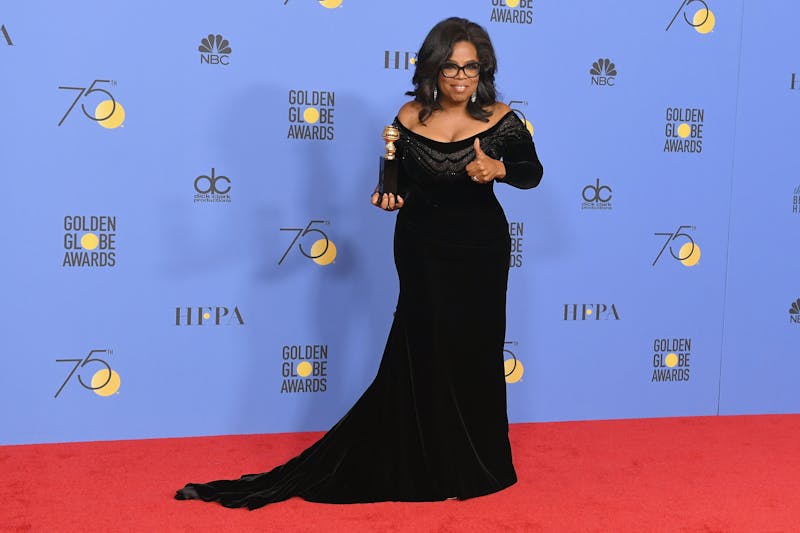The Golden Globe awards on Sunday night represented Hollywood’s first collective response to the fallout from the Harvey Weinstein scandal. In addition to doling out the usual awards for television and film, the show focused on the new Time’s Up alliance to end sexual misconduct in America, a message magnified by the stars’ collective decision to wear black. In the place of colorful designer accessories, however, several actresses wore people.
Topping the bill of the “special plus-ones,” as CNN put it, was Michelle Williams with Tarana Burke, the woman credited with founding the #MeToo campaign. Susan Sarandon brought Rosa Clemente of PR On The Map. Emma Watson brought Marai Larasi, director of Imkaan. Meryl Streep came with Ai-jen Poo of the National Domestic Workers Alliance, while Shailene Woodley appeared with Calina Lawrence, an activist for injustice affecting Native communities. Amy Poehler brought Saru Jayaraman of Restaurant Opportunities Centers United; Laura Dern came with Mónica Ramírez of the Alianza Nacional de Campesinas; and Emma Stone brought Billie Jean King.
These actresses deserve credit for championing their guests’ causes, and any critique of their visual effect doesn’t imply a critique of their motives. But it is nigh-on impossible to amplify a voice on the red carpet, because it is not a space for speech.
The red carpet is a space for visual merchandising. It’s where actresses’ faces and bodies increase or devalue their stock in the market of flesh. Who looks good, who doesn’t? Whose outfit betrays their lack of self-awareness, whose is forward-looking? This market defines future career success or failure, which means the red carpet has always been an element in the matrix of gender injustice. Women are served on the red carpet like chickens on the dinner table. It’s not a neutral stage.
We saw this when E! minimized Tarana Burke to a little rectangle at the bottom of the screen, to make space for Dakota Johnson to twirl in her dress.
E! two seconds after Tarana Burke starts talking pic.twitter.com/s5O9q8e9ch
— Amanda Hess (@amandahess) January 7, 2018
And so each woman of color who accompanied a white actress last night became a kind of human accessory. Again, that is not the fault of their well-meaning white hosts: It is the nature of the machine that manufactures celebrity, particularly female celebrity, in contemporary America. Hollywood is a generator of sexist and racist standards of beauty, and those standards emanate, cumulatively, into many forms of broader social injustice. How can that generator be retrofitted to resist itself?

Oprah Winfrey’s Cecil B. DeMille Lifetime Achievement Award acceptance speech was an interesting counterpoint to the red carpet’s treacherous messaging. Set aside the question of whether or not Oprah Winfrey will run for president one day. Let’s remain a while in the most valuable space that a Hollywood awards ceremony has to offer: a captive space where, like the nervously grinning guests in attendance, you must listen.
A podium is a podium, whether in entertainment or in politics. (This interchangeability has of course played well into President Trump’s hands.) A speech is a speech. If there is a positive outcome to the election of a racist reality television star to the presidency, it may lie in his reconfiguration of political messaging itself. Trump helped create the conditions for Oprah’s speech to sound presidential.
Rather than bemoan the celebrification of government politics, as some in the commentariat have already done, we should value the politicization—the new gravitas of its speech, the new responsibility for its consequences—of celebrity. Oprah is better at it than Trump. She also comes from reality television, but from a genre that has augmented her oratorical powers. We heard that in her speech last night, when she delivered a rendition of Barack Obama’s greatest piece of political messaging: “I’ve interviewed and portrayed people who’ve withstood some of the ugliest things life can throw at you,” Oprah said. “But the one quality all of them seem to share is an ability to maintain hope for a brighter morning, even during our darkest nights.”
Whether or not it is a good idea for Oprah to run for president is a different conversation. But while we are paying attention to the values of the Golden Globes performances, we should note that she expressed gratitude to working class women. She referred to people outside the auditorium, to women “working in factories and they work in restaurants and they’re in academia, engineering, medicine, and science.” She used the words tech, politics, business, Olympics, military.
By comparing the red carpet to the podium as venues for political speech, we can see that Hollywood is not a unified space. The movie and television industries are literally made of communications. Hollywood is like a gigantic switchboard, directing voices of different volumes and degrees of intelligibility into your daily life. It never stops, it is never neutral, and it is never apolitical—even when it is trying to be.
The Golden Globes will hopefully represent a trial stage in the refinement of political messaging in California’s huge and influential communications industry. Everybody woke up talking about the Golden Globes this morning. There’s so much potential energy lying dormant there, and last night’s awards ceremony teaches us that the voice always speaks more clearly than the body.
